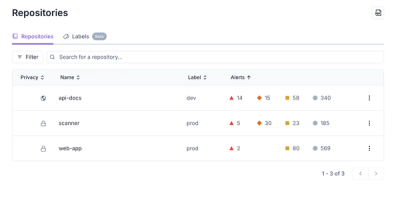
Product
A New Design for GitHub PR Comments
We redesigned our GitHub PR comments to deliver clear, actionable security insights without adding noise to your workflow.
A library for reading and writing Garmin FIT files.
The Flexible and Interoperable Data Transfer (FIT) protocol is designed specifically for the storing and sharing of data that originates from sport, fitness and health devices. The FIT protocol defines a set of data storage templates (FIT messages) that can be used to store information such as user profiles, activity data, courses, and workouts. It is specifically designed to be compact, interoperable and extensible.
python3 -m pip install --upgrade pip
python3 -m pip install --upgrade fit_tool
usage: fittool [-h] [-v] [-o OUTPUT] [-l LOG] [-t TYPE] FILE
Tool for managing FIT files.
positional arguments:
FILE FIT file to process
optional arguments:
-h, --help show this help message and exit
-v, --verbose specify verbose output
-o OUTPUT, --output OUTPUT
Output filename.
-l LOG, --log LOG Log filename.
-t TYPE, --type TYPE Output format type. Options: csv, fit.
fittool oldstage.fit
The following code reads all the bytes from an activity FIT file and then decodes these bytes to create a FIT file object. We then convert the FIT data to a human-readable CSV file.
from fit_tool.fit_file import FitFile
def main():
""" The following code reads all the bytes from a FIT formatted file and then decodes these bytes to
create a FIT file object. We then convert the FIT data to a human-readable CSV file.
"""
path = '../tests/data/sdk/Activity.fit'
fit_file = FitFile.from_file(path)
out_path = '../tests/data/sdk/Activity.csv'
fit_file.to_csv(out_path)
if __name__ == "__main__":
main()
import matplotlib as mpl
import matplotlib.pyplot as plt
import numpy as np
from fit_tool.fit_file import FitFile
from fit_tool.profile.messages.record_message import RecordMessage
def main():
""" Analyze a FIT file
"""
mpl.style.use('seaborn')
print(f'Loading activity file...')
app_fit = FitFile.from_file('./activity_20211102_133232.fit')
timestamp1 = []
power1 = []
distance1 = []
speed1 = []
cadence1 = []
for record in app_fit.records:
message = record.message
if isinstance(message, RecordMessage):
timestamp1.append(message.timestamp)
distance1.append(message.distance)
power1.append(message.power)
speed1.append(message.speed)
cadence1.append(message.cadence)
start_timestamp = timestamp1[0]
time1 = np.array(timestamp1)
power1 = np.array(power1)
speed1 = np.array(speed1)
cadence1 = np.array(cadence1)
time1 = (time1 - start_timestamp) / 1000.0 # seconds
#
# Plot the data
#
ax1 = plt.subplot(311)
ax1.plot(time1, power1, '-o', label='app [W]')
ax1.legend(loc="upper right")
plt.xlabel('Time (s)')
plt.ylabel('Power (W)')
plt.subplot(312, sharex=ax1)
plt.plot(time1, speed1, '-o', label='app [m/s]')
plt.legend(loc="upper right")
plt.xlabel('Time (s)')
plt.ylabel('speed (m/s)')
plt.subplot(313, sharex=ax1)
plt.plot(time1, cadence1, '-o', label='app [rpm]')
plt.legend(loc="upper right")
plt.xlabel('Time (s)')
plt.ylabel('cadence (rpm)')
plt.show()
if __name__ == "__main__":
main()
import datetime
from fit_tool.fit_file_builder import FitFileBuilder
from fit_tool.profile.messages.file_id_message import FileIdMessage
from fit_tool.profile.messages.workout_message import WorkoutMessage
from fit_tool.profile.messages.workout_step_message import WorkoutStepMessage
from fit_tool.profile.profile_type import Sport, Intensity, WorkoutStepDuration, WorkoutStepTarget, Manufacturer,
FileType
def main():
file_id_message = FileIdMessage()
file_id_message.type = FileType.WORKOUT
file_id_message.manufacturer = Manufacturer.DEVELOPMENT.value
file_id_message.product = 0
file_id_message.time_created = round(datetime.datetime.now().timestamp() * 1000)
file_id_message.serial_number = 0x12345678
workout_steps = []
step = WorkoutStepMessage()
step.workout_step_name = 'Warm up 10min in Heart Rate Zone 1'
step.intensity = Intensity.WARMUP
step.duration_type = WorkoutStepDuration.TIME
step.duration_time = 600.0
step.target_type = WorkoutStepTarget.HEART_RATE
step.target_hr_zone = 1
workout_steps.append(step)
step = WorkoutStepMessage()
step.workout_step_name = 'Bike 40min Power Zone 3'
step.intensity = Intensity.ACTIVE
step.duration_type = WorkoutStepDuration.TIME
step.duration_time = 24000.0
step.target_type = WorkoutStepTarget.POWER
step.target_power_zone = 3
workout_steps.append(step)
step = WorkoutStepMessage()
step.workout_step_name = 'Cool Down Until Lap Button Pressed'
step.intensity = Intensity.COOLDOWN
step.duration_type = WorkoutStepDuration.OPEN
step.durationValue = 0
step.target_type = WorkoutStepTarget.OPEN
step.target_value = 0
workout_steps.append(step)
workout_message = WorkoutMessage()
workout_message.workoutName = 'Tempo Bike'
workout_message.sport = Sport.CYCLING
workout_message.num_valid_steps = len(workout_steps)
# We set autoDefine to true, so that the builder creates the required
# Definition Messages for us.
builder = FitFileBuilder(auto_define=True, min_string_size=50)
builder.add(file_id_message)
builder.add(workout_message)
builder.add_all(workout_steps)
fit_file = builder.build()
out_path = '../tests/out/tempo_bike_workout.fit'
fit_file.to_file(out_path)
if __name__ == "__main__":
main()
import datetime
import gpxpy
from geopy.distance import geodesic
from fit_tool.fit_file_builder import FitFileBuilder
from fit_tool.profile.messages.course_message import CourseMessage
from fit_tool.profile.messages.course_point_message import CoursePointMessage
from fit_tool.profile.messages.event_message import EventMessage
from fit_tool.profile.messages.file_id_message import FileIdMessage
from fit_tool.profile.messages.lap_message import LapMessage
from fit_tool.profile.messages.record_message import RecordMessage
from fit_tool.profile.profile_type import FileType, Manufacturer, Sport, Event, EventType, CoursePoint
def main():
# Set auto_define to true, so that the builder creates the required Definition Messages for us.
builder = FitFileBuilder(auto_define=True, min_string_size=50)
# Read position data from a GPX file
gpx_file = open('../tests/data/old_stage_left_hand_lee.gpx', 'r')
gpx = gpxpy.parse(gpx_file)
message = FileIdMessage()
message.type = FileType.COURSE
message.manufacturer = Manufacturer.DEVELOPMENT.value
message.product = 0
message.timeCreated = round(datetime.datetime.now().timestamp() * 1000)
message.serialNumber = 0x12345678
builder.add(message)
# Every FIT course file MUST contain a Course message
message = CourseMessage()
message.courseName = 'old stage'
message.sport = Sport.CYCLING
builder.add(message)
# Timer Events are REQUIRED for FIT course files
start_timestamp = round(datetime.datetime.now().timestamp() * 1000)
message = EventMessage()
message.event = Event.TIMER
message.event_type = EventType.START
message.timestamp = start_timestamp
builder.add(message)
distance = 0.0
timestamp = start_timestamp
course_records = [] # track points
prev_coordinate = None
for track_point in gpx.tracks[0].segments[0].points:
current_coordinate = (track_point.latitude, track_point.longitude)
# calculate distance from previous coordinate and accumulate distance
if prev_coordinate:
delta = geodesic(prev_coordinate, current_coordinate).meters
else:
delta = 0.0
distance += delta
message = RecordMessage()
message.position_lat = track_point.latitude
message.position_long = track_point.longitude
message.distance = distance
message.timestamp = timestamp
course_records.append(message)
timestamp += 10000
prev_coordinate = current_coordinate
builder.add_all(course_records)
# Add start and end course points (i.e. way points)
#
message = CoursePointMessage()
message.timestamp = course_records[0].timestamp
message.position_lat = course_records[0].position_lat
message.position_long = course_records[0].position_long
message.type = CoursePoint.SEGMENT_START
message.course_point_name = 'start'
builder.add(message)
message = CoursePointMessage()
message.timestamp = course_records[-1].timestamp
message.position_lat = course_records[-1].position_lat
message.position_long = course_records[-1].position_long
message.type = CoursePoint.SEGMENT_END
message.course_point_name = 'end'
builder.add(message)
# stop event
message = EventMessage()
message.event = Event.TIMER
message.eventType = EventType.STOP_ALL
message.timestamp = timestamp
builder.add(message)
# Every FIT course file MUST contain a Lap message
elapsed_time = timestamp - start_timestamp
message = LapMessage()
message.timestamp = timestamp
message.start_time = start_timestamp
message.total_elapsed_time = elapsed_time
message.total_timer_time = elapsed_time
message.start_position_lat = course_records[0].position_lat
message.start_position_long = course_records[0].position_long
message.end_position_lat = course_records[-1].position_lat
message.endPositionLong = course_records[-1].position_long
message.total_distance = course_records[-1].distance
# Finally build the FIT file object and write it to a file
fit_file = builder.build()
out_path = '../tests/out/old_stage_course.fit'
fit_file.to_file(out_path)
csv_path = '../tests/out/old_stage_course.csv'
fit_file.to_csv(csv_path)
if __name__ == "__main__":
main()
FAQs
A library for reading and writing Garmin FIT files.
We found that fit-tool demonstrated a healthy version release cadence and project activity because the last version was released less than a year ago. It has 1 open source maintainer collaborating on the project.
Did you know?

Socket for GitHub automatically highlights issues in each pull request and monitors the health of all your open source dependencies. Discover the contents of your packages and block harmful activity before you install or update your dependencies.

Product
We redesigned our GitHub PR comments to deliver clear, actionable security insights without adding noise to your workflow.

Product
Our redesigned Repositories page adds alert severity, filtering, and tabs for faster triage and clearer insights across all your projects.

Security News
Slopsquatting is a new supply chain threat where AI-assisted code generators recommend hallucinated packages that attackers register and weaponize.